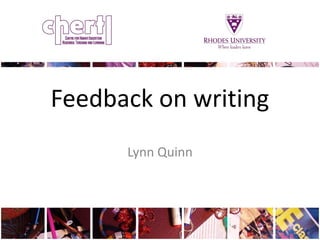
Responding to writing
- 1. Feedback on writing Lynn Quinn
- 2. What is the difference between responding to and marking a piece of writing?
- 3. Responding • Responding is process not product oriented people pay attention to the feedback • Focus is on feedback for improvement rather than on judging or giving a mark • Purpose is to give constructive and formative comments which will assist the writer to revise his/her writing • Providing writers with a sense of audience through having a conversation with them
- 4. • Helping writers to consider their writing from a reader’s point of view (how is the reader being positioned?) • Giving feedback on ‘content’, concepts, logical development of argument • Helping writers to express their understandings in an appropriate genre for intended purpose. Provide feedback against specific criteria? • Assisting writer to use the appropriate literacy, conventions, etc. • Giving constructive and encouraging comments to develop the writers’ confidence
- 5. Kids from broken homes turn to crime.
- 6. According to Smith and Jones (1999) 30% of children between the ages of 9 and 18 from homes where parents are divorced commit some sort of petty crime such as shoplifting.
- 7. All white people are racists. They stole our land and they should go back to Europe where they belong!
- 8. Johnson (1999), in his research in the Gauteng area, found that 34% of black people perceived white people as racist with 19% of those expressing the opinion that white people should return to their countries of origin.
- 9. Understanding academic literacy involves • learning how knowledge is produced and represented in different disciplines and contexts, for example, the conventions for what counts as an acceptable argument or convincing evidence. • learning the strategies for understanding, discussing, organizing and producing texts in different disciplines (e.g. structure, voice, referencing, explicitness, links between theory and practice, vocabulary etc.) • Genre of journal articles (differences)
- 10. The respondent should comment on • Meaning, content, concepts • Genre & academic literacy issues – structure – argument – evidence – cohesive devices – voice – explicitness – positioning of the reader – tentativeness, etc. – Appropriate for specific purpose/specific journal • Surface errors: Grammar, spelling, punctuation
- 11. Ways of responding to writing: depends on individual & quality of writing • read whole paper first: prioritise issues; global comments • respond against specific journal criteria • ask questions in the body of the text • explicit and direct comments; clear and specific strategies for revision • relationship between in text-and summative comments
- 12. Ways of responding cont.. • constructive, positive feedback • comments to develop metacognitive knowledge • respond as a reader to a specific writer (sense of audience) • avoid unfamiliar jargon • do not take over the writing • Tone? • Track changes?
